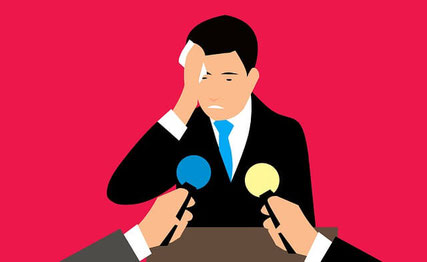
Feelings aren’t facts, I argued in last week's Southern Star. The column is reproduced below.
Feelings aren’t facts. Regular readers will recognise that phrase often crops up in my columns. It’s a simple but important point because you can get into all sorts of bother if you rely on your feelings to guide your actions and beliefs.
Consider this story about a socially anxious woman, as related by cognitive behavioural therapist Dr Heather Stone. Socially-anxious people have an excessive fear of being judged or being seen in a negative light by others, and tend to think their social performance is much worse than it really is. This particular client was trying to persuade Dr Stone that she performed poorly in public-speaking situations. As proof, she brought in two audio recordings containing separate interviews where she spoke in her area of expertise. The first tape, she said, ‘was a disaster’. The second, she admitted, ‘wasn’t so bad; I guess I did OK’.
Intrigued, Dr Stone listened closely to the two recordings, searching for any poor answers, long pauses, stutters, and so on. However, she found both interviews to be ‘nearly flawless’ and ‘essentially the same’. After listening, the client also recognised that the two interviews were fairly identical and that she did well in both cases.
So why had she initially believed one interview was so much poorer than the other? It turned out that in the first case, she was sitting face-to-face with the interviewer in a recording studio, something most people would find stressful. The second case was a phone interview. She was at home, recording the interview while she sat in bed, in her pyjamas, with her cat. Consequently, the first interview was more stressful. She felt more nervous in the face-to-face interview, whereas the second one felt more comfortable. This gave her the feeling one was terrible and one was OK, but this distinction was only in her head – not in reality.
‘Socially-anxious persons incorrectly use their anxiety as a measuring stick that tells them how well they are functioning’, says Dr Stone. ‘Rather than considering objective criteria, they make the mistake of evaluating their performance based on how anxious they are – but this turns out to be an unreliable measure’.
This is known as emotional reasoning – the mistaken assumption that if something feels true, it must be true.
‘But feeling judged doesn’t actually equate to being judged’, Dr Stone points out. ‘Feeling stupid doesn’t equate to sounding stupid. For this reason, it would be helpful to use the coping statement, “It feels true but it might not be true”.
ANXIETY IS A BLUFFER
Dr Steven Phillipson, a psychologist specialising in anxiety and obsessive-compulsive disorder, stresses the same point. With OCD, for example, the feelings of fear and terror experienced can feel so compelling that it’s very hard for the person to accept their fears are unjustified. Thus, a client might say they know they can’t catch AIDS from touching the door knob, but it “feels” so dangerous they actually believe they’re at risk. With OCD, ‘you cannot use your feelings to determine if a threat is “real”’, says Phillipson. ‘Doing so is a little like asking the Devil for directions to Heaven’.
If you are prone to anxiety, it’s important to remember you cannot trust your anxious feelings. Anxiety is a great bluffer, making us feel we are in danger when the threat is minimal. If you’re watching a horror movie, your heart will be beating faster. You will feel tense. You might scream out loud. You’ll feel scared, but you know you can’t rely on your feelings in this instance; your thinking self reminds you the danger isn’t real, that it’s just a movie. You should aim to be similarly calm in other instances of anxiety, as opposed to automatically yielding to the feelings.
With both anxiety and low mood, it’s generally a good idea to do the opposite of what your feelings are telling you to do. Feeling afraid doesn’t mean you are in danger; feeling useless doesn’t mean you are useless; feeling hopeless doesn’t mean things are hopeless. That’s why it’s crucial not to let your feelings determine your choices in life. As Steven Phillipson puts it, don’t let the tail wag the dog.